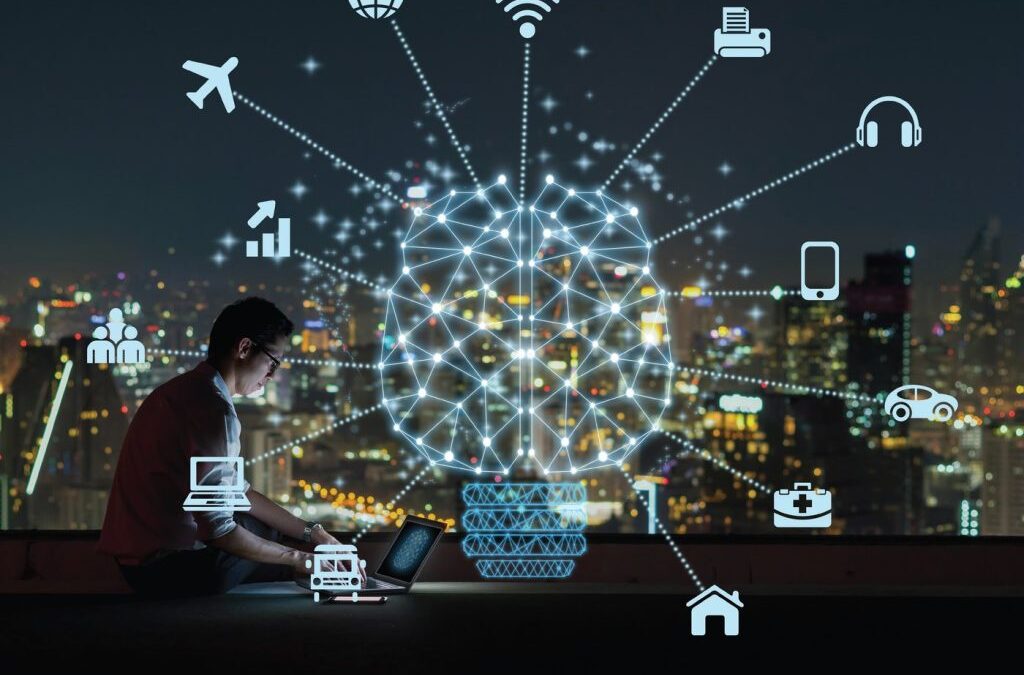In Part 1, we explored how Artificial Intelligence is becoming a defining force in our world. Now, we turn to the deeper implications (ethical, social, and economic) and how we can shape this revolution with intention.
4- Societal Implications and Ethical Considerations
As Artificial Intelligence becomes more pervasive, its presence is not only technical, it is deeply social. Like every revolutionary technology before it, AI brings with it a host of unintended consequences, ethical dilemmas, and societal disruptions. Yet unlike many earlier tools, AI does not merely amplify human labor or extend communication; it begins to simulate aspects of human judgment and decision-making. This makes its impact far more personal, and its consequences far more complex.
One of the most immediate concerns is the displacement of jobs. Just as the industrial revolution shifted workers from farms to factories, the AI revolution is poised to shift roles from routine cognitive labor to higher-value, creative, or strategic tasks. Automation is already transforming industries such as manufacturing, retail, transportation, and customer service. A 2020 report by McKinsey estimated that by 2030, up to 375 million workers worldwide may need to switch occupational categories due to automation. While AI also creates new jobs and opportunities, the transition will not be smooth or evenly distributed. Workers in lower-skilled roles or regions with limited access to retraining programs may bear the brunt of this shift.
Beyond economics, there is the growing issue of algorithmic bias. AI systems are trained on historical data, which often reflect existing social inequalities. If left unchecked, these systems can replicate, and even reinforce, discrimination in hiring, lending, policing, and healthcare. For instance, studies have shown that facial recognition systems perform significantly less accurately on people with darker skin tones, and hiring algorithms have been documented favoring certain gender or racial profiles based on biased training data. These are not harmless technical flaws; they can have life-altering consequences for individuals and communities.
Closely tied to bias is the issue of transparency and accountability. AI systems, particularly those based on deep learning, often operate as “black boxes,” producing outputs that are difficult to trace or explain. When an AI model denies someone a loan, prioritizes a resume, or influences a court’s decision, it is critical that those affected understand how and why that decision was made. Yet today, that level of clarity is often absent. Without explainability, individuals and institutions lose the ability to question, challenge, or appeal the decisions that affect them most.
Privacy is another area under increasing strain. AI depends on massive volumes of data to function effectively; data about our habits, preferences, voices, faces, and even emotions. Whether we are sharing location data for navigation or allowing smart assistants into our homes, we are generating personal information that can be harvested, analyzed, and monetized. In the absence of robust regulatory frameworks, individuals have limited visibility into how their data is used, who has access to it, and how long it is stored. The more deeply AI integrates into daily life, the more blurred the lines become between convenience and surveillance.
There is also a broader philosophical question that looms over the rise of intelligent systems: What does it mean to be human in an age of artificial intelligence? When machines can write poetry, paint portraits, compose music, and offer emotional support through language models, we are forced to reconsider the uniqueness of human creativity and emotion. This does not imply that AI is replacing humanity. However, it does challenge us to more clearly define what qualities we cherish and want to preserve; whether they be empathy, intuition, spontaneity, or ethical reasoning.
Furthermore, the global distribution of AI development and control raises geopolitical and ethical concerns. A handful of nations and corporations currently dominate the development of advanced AI models, potentially consolidating power and influence in ways that may widen global inequalities. Countries with limited access to computational infrastructure and technical talent risk falling behind, not just economically, but in terms of governance, autonomy, and cultural sovereignty.
These challenges are not arguments against AI. Rather, they are reminders that technology, no matter how intelligent, is not neutral. It reflects the intentions, values, and assumptions of those who build it. As such, the question is not whether AI is good or bad. The more important question is how we guide its development, who is included in the conversation, and whose interests it ultimately serves.
To move forward responsibly, we must take a multidisciplinary approach. Technologists cannot work in isolation. Ethicists, sociologists, legal experts, educators, and everyday citizens all have a role to play in shaping the future of AI. Moreover, companies and governments must prioritize transparency, equity, and accountability…not just as legal requirements, but as guiding principles.
We are building systems that will interact with billions of people. Whether those systems reinforce injustice or promote fairness will depend on the care and wisdom we bring to their design today.
5- Shaping the AI-Driven Future
Standing at the threshold of the AI era, we are faced with a rare opportunity, perhaps even a responsibility, to shape its trajectory while it is still unfolding. Unlike past revolutions, which often took decades or even centuries to mature before their social impacts were fully understood, the rise of Artificial Intelligence is happening in real time and with global visibility. This means we are not simply passengers on this journey. We are the architects of what comes next.
To ensure AI becomes a force for good, society must approach its development and deployment with intention, foresight, and collective responsibility. The future will not be determined solely by the ingenuity of engineers or the vision of CEOs. Instead, it will depend on how diverse stakeholders come together to ask the right questions, define shared values, and make decisions that reflect long-term thinking rather than short-term gain.
One of the most urgent areas of focus is education and workforce transformation. As AI automates routine tasks and shifts the skills demanded by employers, educational systems must evolve in parallel. Traditional models of instruction, largely designed for the industrial age, are no longer sufficient. We need to prepare students not only to work with technology but also to think critically, adapt quickly, and engage in lifelong learning. Technical skills such as coding and data literacy are essential, but so are emotional intelligence, ethical reasoning, and cross-cultural communication. For those already in the workforce, governments and companies must invest in retraining and reskilling programs that equip people to thrive in an AI-augmented world, not fall behind in it.
At the same time, we must build and enforce robust ethical frameworks for the design and use of AI. These frameworks must be more than symbolic guidelines; they need to be practical, enforceable, and adaptable. Principles such as fairness, accountability, transparency, privacy, and human agency should not be afterthoughts in AI development, they should be embedded into the system architecture from the start. This requires a shift in mindset from “Can we do it?” to “Should we do it?” and “How will it affect the world around us?”
Policy and regulation will play a critical role. As of now, many governments are racing to catch up with the pace of technological change. Some have introduced AI governance frameworks or data protection laws, but a comprehensive and globally coordinated approach remains elusive. Policymakers must balance innovation with oversight, ensuring that regulation protects fundamental rights without stifling progress. This is no easy task. However, history shows that thoughtful regulation, when done in collaboration with industry and civil society, can create a more stable, equitable foundation for innovation to flourish.
In addition to law and governance, inclusive development must become a central priority. AI should not be designed by and for a narrow demographic. Instead, it should reflect the diversity of the world it aims to serve. This includes involving women, minorities, indigenous communities, people with disabilities, and voices from the Global South in the design and decision-making processes. Representation matters not only in who builds the technology but also in whose lives are shaped by it. Inclusive AI development leads to more equitable systems, greater trust, and better outcomes for everyone.
Moreover, we must nurture a public culture that promotes AI literacy. The average person interacts with AI on a daily basis (whether through recommendation algorithms, voice assistants, or automated services) yet many remain unaware of how these systems work or the implications they carry. Educating the public about AI’s capabilities, limitations, and potential impacts will empower individuals to make informed choices and engage in civic dialogue. In turn, this creates a healthier democratic environment where citizens can hold institutions accountable and influence the ethical direction of technological progress.
Businesses, too, must rise to the occasion. Companies should adopt not just a competitive strategy for AI, but also a moral one. This includes auditing AI systems for bias, being transparent about data usage, respecting user consent, and openly addressing failures when they occur. The organizations that succeed in the long run will not be those that exploit AI the fastest, but those that use it most responsibly and align it with human well-being.
Finally, we must foster an ethos of shared stewardship. No single entity; be it a corporation, university, or government; can dictate the future of AI in isolation. It will take collaboration across borders, sectors, and disciplines. It will require humility, imagination, and a willingness to engage with difficult questions. And most importantly, it will require a commitment to putting people first.
We are building tools that could influence everything from justice systems to warfare, from education to emotional connection. This is not just about technological evolution. It is about deciding what kind of society we want to be and ensuring that our tools help us become that, rather than lead us away from it.
6- How AI is Reshaping Businesses and the Economy
While Artificial Intelligence is redefining individual experience and societal structure, perhaps nowhere is its impact more immediately visible than in the world of business. Across industries, AI is doing more than streamlining operations…it is transforming the very foundations of how companies create value, engage with customers, make decisions, and compete in the global marketplace.
In many ways, AI is becoming the new infrastructure of enterprise. Just as electricity and the internet once revolutionized business processes, AI is now becoming indispensable to modern business strategy. From startups to global corporations, organizations are embedding AI into their workflows, products, and services in order to boost efficiency, reduce risk, and unlock new forms of competitive advantage.
One of the clearest examples of this is in customer experience. Businesses are using AI-powered chatbots and virtual assistants to handle routine customer queries, freeing human representatives to focus on more complex and nuanced interactions. These systems operate around the clock, in multiple languages, and at massive scale. For instance, companies like Sephora, Mastercard, and Emirates Airline are deploying conversational AI to personalize support and reduce wait times. The result is not only cost savings, but also faster, more responsive customer service that meets modern expectations.
In retail and marketing, AI enables hyper-personalization. Companies analyze vast amounts of customer data to recommend products, tailor promotions, and predict buying behavior. Amazon, for example, uses AI to power its recommendation engine, which is estimated to drive up to 35% of the company’s revenue. Similarly, Netflix uses machine learning to customize its homepage for each user, enhancing viewer satisfaction and increasing engagement.
In operations and supply chain management, AI improves forecasting, demand planning, and inventory control. By processing historical data, weather patterns, and real-time logistics information, AI helps companies like Unilever and DHL optimize supply chains, reduce waste, and respond more agilely to market disruptions. During the COVID-19 pandemic, AI models played a crucial role in adjusting global supply strategies amid volatile demand and restricted movement.
In human resources, AI is revolutionizing how companies attract, assess, and retain talent. Tools now exist to screen thousands of resumes in seconds, detect red flags, and even analyze video interviews to assess soft skills such as communication, adaptability, and empathy. While this can accelerate hiring and improve fit, it also raises questions about bias, fairness, and transparency, underscoring the need for careful implementation.
In finance, AI is used for fraud detection, credit scoring, portfolio management, and algorithmic trading. JPMorgan Chase, for instance, uses AI to review commercial loan agreements, reducing the time needed from 360,000 hours annually to a few seconds. Meanwhile, fintech startups use AI to offer personalized investment advice at a fraction of the cost of traditional wealth management services.
The impact extends to product development and innovation strategy as well. Companies are increasingly using AI to analyze customer feedback, identify unmet needs, and simulate product performance before physical prototypes are built. In sectors such as pharmaceuticals and automotive engineering, AI significantly shortens R&D cycles, saving both time and money.
However, this transformation is not without challenges. As businesses integrate AI deeper into their operations, they must confront new forms of risk. These include model drift (where AI systems lose accuracy over time), ethical risks (such as discriminatory outputs or lack of transparency), and reputational risks stemming from public mistrust. Organizations that fail to anticipate these risks, or that deploy AI without adequate governance, may suffer long-term consequences.
Furthermore, AI is redefining leadership and culture within organizations. Executives must now understand not only traditional financial and operational metrics, but also the implications of data strategy, algorithmic accountability, and digital ethics. As AI systems influence hiring decisions, pricing models, and customer interactions, company values must be explicitly embedded in technical systems. This requires new forms of collaboration between business leaders, data scientists, ethicists, and legal teams.
Small and medium-sized enterprises (SMEs) are also entering the AI race. Thanks to cloud computing and Software-as-a-Service (SaaS) models, advanced AI capabilities are no longer reserved for tech giants. SMEs can now access predictive analytics, automation tools, and AI-driven insights without massive upfront investment. This democratization of AI is narrowing the innovation gap and allowing smaller players to compete on intelligence rather than scale.
According to PwC, AI could contribute up to $15.7 trillion to the global economy by 2030, making it one of the largest economic drivers in the coming decade. Much of this value will come not just from labor automation, but from the creation of entirely new products, services, and markets. As businesses continue to experiment with AI-enabled offerings, from AI-generated fashion designs to personalized digital healthcare, the line between what is human-made and machine-enhanced will continue to blur.
In the end, AI is not simply a tool for optimizing business operations. It is a strategic imperative that is redefining what businesses are, how they compete, and what value they offer. Those who embrace AI with responsibility, creativity, and foresight will not only thrive in the new economy but help shape it.
Conclusion: The Intelligence Age Has Arrived…Now What Will We Make of It?
From the taming of fire to the birth of the internet, human progress has been defined by a handful of pivotal moments…turning points that forever altered how we live, think, and organize society. Today, we stand at another such threshold. Artificial Intelligence is not a futuristic concept on the horizon. It is already here. It is shaping our cities, guiding our decisions, powering our economies, and influencing our values.
This revolution is unlike any before it. For the first time in history, we are building systems that can reason, learn, and adapt at scale. These systems are not just augmenting human labor or accelerating information; they are beginning to reshape the very architecture of our thinking, our relationships, and our institutions.
AI is embedded in how we work, how we learn, and how we make sense of the world. Businesses are being rebuilt from the inside out. Entire industries are being transformed by automation, personalization, and predictive intelligence. At the same time, questions of fairness, accountability, privacy, and identity are becoming urgent and unavoidable.
The stakes are high, not because AI is inherently good or bad, but because it is powerful. It reflects the values of those who design it and the priorities of those who govern it. Therefore, our greatest responsibility is not simply to marvel at its capabilities but to steer its development toward outcomes that are ethical, inclusive, and aligned with human dignity.
This moment calls for more than innovation. It calls for intention. We must educate and reskill our people. We must regulate wisely without stifling progress. We must design systems that serve everyone, not just the few. Most importantly, we must resist the temptation to treat this technology as inevitable or neutral.
Artificial Intelligence is not destiny. It is a tool. What we build with it will depend on the courage, foresight, and empathy we bring to this moment.
The intelligence age has begun. The real question is not whether it will change the world. The question is whether we will rise to the challenge of guiding it, so that what we create will truly serve the world we want to live in.
Missed Part 1? Read it by following this link: AI as Infrastructure: The Dawn of a New Era in Human Progress





